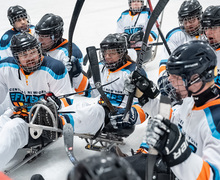Aminata Cairo highlights a ‘storytelling approach’ to talking about diversity and inclusion
Lars Jendruschewitz | Assistant Photo Editor
Aminata Cairo poses with her book, “Holding Space.” In the book, she presents a more “accessible” approach to topics of diversity and inclusion.
Get the latest Syracuse news delivered right to your inbox.
Subscribe to our newsletter here.
In 2014, after police killed Michael Brown in Ferguson, Missouri, the white pastor of Love Church called Aminata Cairo, hoping to better understand the implications of racism. As a Black woman with three sons, she wrote Brown’s killing had “hit her deeply.”
The two spoke for two hours, and he then asked her to speak to the church’s entire congregation that Sunday. Although Cairo had never spoken to a large group of white people about racism, the sincerity of the pastor’s request — one she had never gotten before — struck her.
That Sunday, Cairo spoke. And to her surprise, the congregation listened.
“Can we start appreciating and really listen to each other’s stories without all these preconceived notions, without judgment?” Cairo told The Daily Orange. “That’s what I try to work on, and that’s what I see missing a lot in (diversity and inclusion).”
Cairo wrote her book, “Holding Space: A Storytelling Approach to Trampling Diversity and Inclusion,” and its sister podcast of the same name, with that same value of listening in mind. Last week, Cairo visited Syracuse University at the request of Diane Grimes, Cairo’s friend and an associate professor in the department of communication and rhetorical studies. Talking about her book and own life, she said seeing students connect with her work was “powerful.”
The two educators each held events last week at SU, Grimes on Feb. 14 about her book “Through the Lens of Whiteness: Challenging Racialized Imagery in Pop Culture” and Cairo on Feb. 15 about “Holding Space.”
Cairo wanted to write a book that was accessible – that her mom could understand. She didn’t want an academic book bogged down by references and intellectual language; she wanted a story about her life that considered a different approach to diversity and inclusion conversations.
She is often asked why she chose the subtitle, “A storytelling approach to trampling diversity and inclusion.” The wording of the title, she said, is not about destroying the diversity and inclusion system in place, but to move it forward.
Cairo’s “storytelling approach” emphasizes listening to other’s stories and sharing one’s own. Her philosophy is that when people listen to each other’s experiences, it breaks the walls that divide people in ways that “boring” and “dry” PowerPoints simply cannot.
“People always ask me about the ‘trampling,’” Cairo said. “I feel like I’m stepping on top of the diversity and inclusion work with the idea of going beyond it, not just to destroy it. We’ve done it, but it only goes so far right? For me it doesn’t go far enough.”
In addition to teaching, Cairo has worked in diversity and inclusion herself. After being the policy advisor in diversity and inclusion at Leiden University, she was an inclusivity lector at various schools in the Netherlands. Cairo also worked as a self-employed consultant, leading workshops, keynotes and trainings on the topic of inclusivity and emphasizing that “every story has value.”
In her time in diversity and inclusion, Cairo noticed that her colleagues’ work was “too intellectual.” At that time, Cairo already preferred her more accessible storytelling approach to dealing with the topics of identity and inclusion.
“I noticed that my approach is very different from everybody else’s,” she said. “Yes, I might be Black, but there’s so much more to my story. When you limit (inclusivity) to (that), then you lose out so much of who we are as people.”
Ellany Tsin, a senior in the communication and rhetorical studies department who attended Cairo’s event, appreciated her recognition that “not every student learns through understanding academic texts.”
Cairo’s book presentation at SU began with her singing, featuring stories from her life and a few chapters read aloud from her book. At one point, she had attendees close their eyes, breathe in and out, think of a person in their life who helped them get to where they are and thank them out loud. These “uncomfortable” moments, Cairo said, are commonplace in her presentation.
“Hearing Dr. Cairo speak about her own journey and her book made me reflect on what (it means) to hold and create space,” said Janae Kea, a second-year graduate student in the communication and rhetorical studies department. “She really inspired me… to continue to express myself how I want and (to) share stories I (want) to share.”
In her book, Cairo said she immediately identified “holding space” — which she explained as the idea of creating space, both internally and externally, to have conversations and connect with oneself or others — as the key concept to write through.
“There’s this whole idea that we want to connect with each other and hold the space for each other,” Cairo said. “To say that this space is safe enough, this space is comfortable. You don’t have to think like me, but you’re allowed to be here.”
When Cairo was ready to publish, however, she ran into roadblocks. Publishers told her “Holding Space” was “too academic” for casual readers but that “it wasn’t academic enough” to be published as scholarly work. Determined to get it out there, she self-published.
“The book is about not fitting in, and I wrote it for us who do not fit in,” she said. “So the fact that the publisher said, ‘Well, you don’t fit,’ I didn’t mind.”
Given her prior work, Cairo has presented plenty of talks similar to Thursday’s at SU. When talking about inclusivity, she said she knows what she isn’t: “gezellig.”
Cairo said “gezellig” — a Dutch word which translates to pleasant, cozy or comfortable — is a “big part” of Dutch culture. Conversations about diversity, Cairo said, are not always “gezellig.”
“I take people in the discomfort. Can you sing a song with me that you don’t know?” Cairo said. “By using the arts, it forces people to go beyond just their intellect because again, a lot of times we just hide in our intellect.”
Published on February 19, 2024 at 10:43 pm
Contact Griffin: gbrown19@syr.edu






